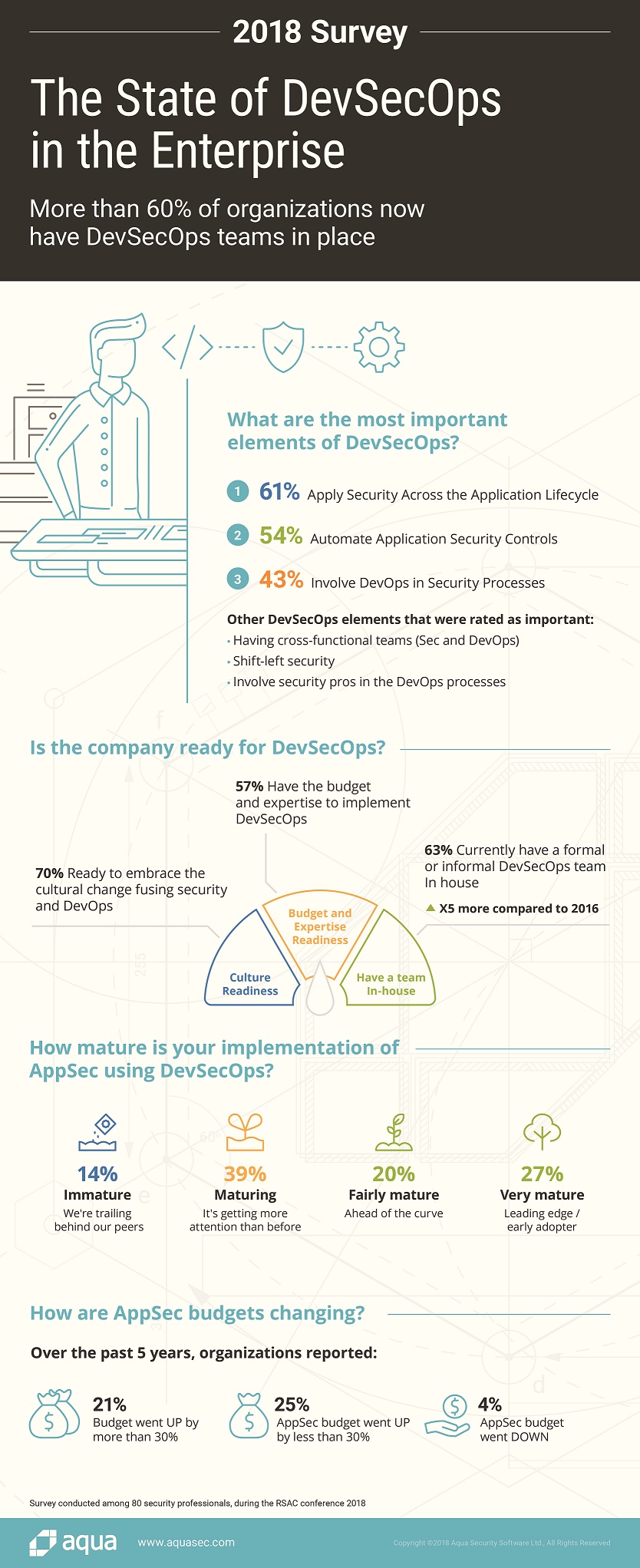Kong announced the commercial availability of Kong Konnect Dedicated Cloud Gateways on Amazon Web Services (AWS).
DevSecOps is quickly gaining support and traction, within and beyond information security teams. In fact, 70% of respondents believe their culture can embrace the change needed to fuse Security and DevOps, according to a new survey of 80 security professionals by Aqua Security.
“DevSecOps provides the opportunity to re-work application security processes to align with the rise of cloud-native application development and a much more security-minded business culture,” said Alan Shimel, CEO of Media Ops, DevOps focused events and online publisher. “Given how new and transformative the discipline of DevSecOps is, I was pleased to learn that survey participants are confident they have the funds, talent and culture in place needed to successfully implement it.”
DevSecOps is maturing in a culture where multiple stakeholders are highly motivated to do it right
The main difference between cybersecurity ten years ago and today is that now, it’s becoming everyone’s job to help minimize threats, not just members of the information security team. DevSecOps in particular is an emerging discipline that, despite the cybersecurity skills shortage and its inherent complexity, is poised to thrive because it relies on shift-left security automation to enable much of the execution as part of the build process.
It's still early days, but right now, DevSecOps is maturing in a culture where multiple stakeholders are highly motivated to do it right.
Key findings from the survey include:
■ 57% believe they have the human and financial resources in place to implement DevSecOps
■ 62% reported they currently had either a formal or informal DevSecOps team in-house
■ 47% reported they are fairly or very mature in their implementation of DevSecOps for application security; another 39% ranked themselves as maturing
When asked to rank the three most important elements of DevSecOps, respondents ranked:
■ Applying security across the app lifecycle (61%)
■ Automating application security controls (52%)
■ Involving DevOps in security processes (43%)
Additionally, respondents were asked about budget trends, with 76% of the sample reporting their application security budget has increased over the past five years, 25% reporting it went up between 10-30%, and 14% sharing that it went up by more than 40%.
While this survey differs from our 2017 Container Security in the Enterprise Survey, when viewed chronologically, the data sets suggest that there is a rapid progression of DevSecOps. Last year, only 13% of a similar pool of respondents reported they had a DevSecOps team in place; less than a year later, that number has skyrocketed to 62%.

Industry News
Pegasystems announced the general availability of Pega Infinity ’24.1™.
Sylabs announces the launch of a new certification focusing on the Singularity container platform.
OpenText™ announced Cloud Editions (CE) 24.2, including OpenText DevOps Cloud and OpenText™ DevOps Aviator.
Postman announced its acquisition of Orbit, the community growth platform for developer companies.
Check Point® Software Technologies Ltd. announced new email security features that enhance its Check Point Harmony Email & Collaboration portfolio: Patented unified quarantine, DMARC monitoring, archiving, and Smart Banners.
Automation Anywhere announced an expanded partnership with Google Cloud to leverage the combined power of generative AI and its own specialized, generative AI automation models to give companies a powerful solution to optimize and transform their business.
Jetic announced the release of Jetlets, a low-code and no-code block template, that allows users to easily build any technically advanced integration use case, typically not covered by alternative integration platforms.
Progress announced new powerful capabilities and enhancements in the latest release of Progress® Sitefinity®.
Buildkite signed a multi-year strategic collaboration agreement (SCA) with Amazon Web Services (AWS), the world's most comprehensive and broadly adopted cloud, to accelerate delivery of cloud-native applications across multiple industries, including digital native, financial services, retail or any enterprise undergoing digital transformation.
AppViewX announced new functionality in the AppViewX CERT+ certificate lifecycle management automation product that helps organizations prepare for Google’s proposed 90-day TLS certificate validity policy.
Rocket Software is addressing the growing demand for integrated security, compliance, and automation in software development with its latest release of Rocket® DevOps, formerly known as Aldon®.
Wind River announced the latest release of Wind River Studio Developer, an edge-to-cloud DevSecOps platform that accelerates development, deployment, and operation of mission-critical systems.
appCD announced its generative infrastructure from code solution now supports Azure Kubernetes Service (AKS).
Synopsys announced the availability of Black Duck® Supply Chain Edition, a new software composition analysis (SCA) offering that enables organizations to mitigate upstream risk in their software supply chains.




